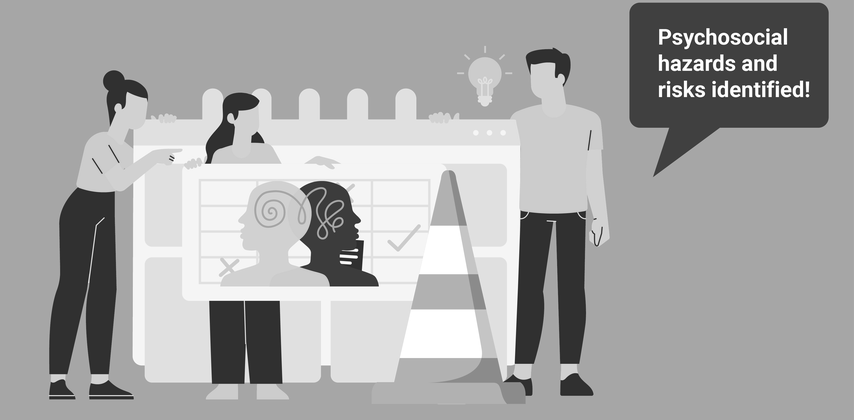Work Health and Safety - Psych…

27 Feb 2024
With the commencement of the Regulation in South Australia relating to psycho-social injuries from 25 December 2023, it is timely to consider one of the key cases that deals with some of the potential issues.
The matter of Kozarov v State of Victoria [2022] HCA 12 is a relevant case for all employers managing the health and wellbeing of employees. While the case was one dealing with a common law claim of negligence, some of the legal principles also are relevant in potential criminal prosecution under the Work Health and Safety Act.
In the matter of Kozarov, the High Court upheld an appeal from the Victorian Court of Appeal. This case was in relation to a negligence claim brought by a former solicitor in the Specialist Sexual Offences Unit of the Victorian Office of Public Prosecutions.
Ms Kozarov, worked on serious sexual offences prosecutions involving allegations of child rape and gross depravity.
In February 2012, Ms Kozarov was diagnosed with post-traumatic stress disorder (PTSD) resulting from vicarious trauma which she had suffered in the course of employment. As a result of her PTSD, she was also later diagnosed with a major depressive disorder as a corollary of her PTSD.
At first instance, Ms Kozarov succeeded and was awarded damages for the negligent failure of the employer to prevent psychiatric injury to Ms Kozarov in the course of her employment as a solicitor.
On appeal, the Victorian Court of Appeal agreed with the trial judge's finding that the employer was on notice of a risk to Ms Kozarov's mental health by the end of August 2011. However, it disagreed with the trial judge's finding that the breach of duty caused the exacerbation of Ms Kozarov’s psychiatric injury. The Court of Appeal held that there was insufficient evidence that protective steps, such as rotating Ms Kozarov to a different unit, would have prevented her psychiatric injury. Accordingly, it held there was a lack of causation between the employer's breach of duty and the exacerbation of Ms Kozarov's psychiatric injury.
The primary question before the High Court was whether the Court of Appeal was correct in finding that the employer's failure to take a reasonable measure in response to evident signs of psychiatric injury from vicarious trauma suffered by Ms Kozarov had caused the exacerbation and prolongation of her psychiatric injury.
The High Court agreed that the employer was on notice that Ms Kozarov was at risk of harm from her work. The High Court took into account the terms of the employer's Vicarious Trauma (VT) Policy, in concluding that the employer had an appreciation of the serious risk to mental health posed by the work undertaken in the area in which Ms Kozarov practised. The Court specifically concluded that “no further warning signs were necessary” to oblige the employer to take reasonable steps to safeguard Ms Kozarov's mental health, noting that none of the protective measures outlined in the VT Policy, or any other reasonably available preventative or protective measures, were implemented by Ms Kozarov's managers.
Chief Justice Kiefel and Justice Keane further observed that the employer had breached its duty of care to Ms Kozarov from the commencement of her employment, a view that was shared by Justice Edelman.
On the question of causation, the Court had to consider whether Ms Kozarov would have accepted an offer of rotation out of the branch where she worked to another section of the organisation, to thereby avoid the exacerbation of her PTSD.
The High Court agreed with the trial judge's finding that Ms Kozarov would have co‑operated with steps to rotate her out of the division where she worked, had those steps been taken subsequent to occupational screening at the end of August 2011. This was based on the following factors:
Thus, causation was established between the breach of the employer's duty and Ms Kozarov's injury and the orders of the Court of Appeal were set aside.
It should also be noted that in their joint judgment, Chief Justice Kiefel and Justice Keane cautioned that:
"a demand by employees for a reduction in their workload may or may not be a reasonable demand as a matter of industrial relations; but, of itself and however intemperate the terms in which such a demand might be made, it would not, in general, reasonably be understood by the employer as an indication that the employees are suffering, collectively or individually, impairments to their mental health. The contrary view would make the robust bargaining that is a familiar feature of industrial relations in Australia an occasion of peril for all concerned."
The High Court decision confirmed that employers must take precautions to control known risks to the health and safety of employees, including known risks that arise from the nature of the work being undertaken by the employees.
Where an employer has policies that identify risks to health and safety and measures to eliminate or reduce such risks, this may be taken into account in the assessment of the matters of which the employer is on notice. As such, it is critical that the roles and responsibilities of workplace participants in implementing these policies are clearly understood and implemented.
As stated above, while this case is not directly relevant to criminal prosecutions, the case is a timely reminder of the duty imposed on employers, under the Work Health and Safety Act, to ensure so far as reasonably practicable that risks to health and safety are:

27 Oct 2025
Legal Risks of Workplace Policies – Elisha v Vision Australia Continue Reading
16 Oct 2025
Shopov Giourgas Lawyers Recognised as a First Tier Workers Compensation Law Firm for 2025 Continue Reading
22 Sep 2025
Navigating the Complexities of Noise-Induced Hearing Loss Claims: Differing Opinions on Tinnitus Continue Reading